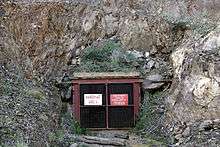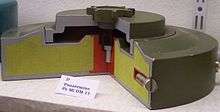Definify.com
Webster 1913 Edition
Mine
Mine
Mine
,Mine
,Webster 1828 Edition
Mine
MINE
,MINE
,MINE
,MINE
,Definition 2026
Mine
Mine
English
Pronoun
Mine
- Alternative letter-case form of mine often used when speaking as God or another important figure who is understood from context.
mine
mine
English
Pronoun
mine
- My; belonging to me; that which belongs to me.
- Used predicatively.
- The house itself is mine, but the land is not.
- Used substantively, with an implied noun.
- Mine has been a long journey.
- Used absolutely, set off from the sentence.
- Mine for only a week so far, it already feels like an old friend.
- (archaic) Used attributively after the noun it modifies.
- a. 1611, William Shakespeare, The Tempest, Act V, Scene 1:
- […] Flesh and blood, / You, brother mine, that entertain'd ambition, / […]
- a. 1611, William Shakespeare, The Tempest, Act V, Scene 1:
- (archaic) Used attributively before a vowel.
- 1862 February, Julia Ward Howe, "The Battle Hymn of the Republic", in The Atlantic Monthly, Volume IX, Number LII, page 10,
- Mine eyes have seen the glory of the coming of the Lord: / […]
- 1862 February, Julia Ward Howe, "The Battle Hymn of the Republic", in The Atlantic Monthly, Volume IX, Number LII, page 10,
- Used predicatively.
Usage notes
- My and mine are essentially two forms of the same word, with my being used attributively before the noun, and mine being used in all other cases, as may be seen in most of the usage examples and quotations above. In this respect, this word is analogous to most of the other possessive pronouns (e.g. your vs. yours), as well as a number of other noun modifiers, such as lone/alone.
- Historically, my came to be used only before a consonant sound, and later came to be used regardless of the following sound. Nonetheless, mine still sees archaic pre-vocalic use, as may be seen in the 1862 quotation above.
Translations
|
|
See also
| Number | Person | Type | Subject | Objective | Reflexive | Possessive adjective | Possessive pronoun |
|---|---|---|---|---|---|---|---|
| Singular | First | — | I | me | myself | my, mine (archaic) |
mine |
| Second | — | you | you | yourself | your | yours, yourn (obsolete outside dialects) |
|
| Archaic | thou | thee | thyself, theeself |
thy, thine |
thine | ||
| Third | Masculine | he | him | himself, hisself (archaic) |
his | his, hisn (obsolete outside dialects) |
|
| Feminine | she | her | herself | her | hers, hern (obsolete outside dialects) |
||
| Neuter | it | itself | its | its | |||
| Indefinite | one | oneself | one's | — | |||
| Plural | First | — | we | us | ourselves | our | ours, ourn (obsolete outside dialects) |
| Second | — | you, ye (archaic) |
you | yourselves | your | yours, yourn (obsolete outside dialects) |
|
| Third | — | they | them | themselves | their | theirs, theirn (obsolete outside dialects) |
|
Etymology 2
From Middle English, from Old French mine, from Late Latin mina, from Gaulish (compare to Welsh mwyn, Irish míanach (“ore”)), from Proto-Celtic *mēnis (“ore, metal”).
Noun
mine (plural mines)

- An excavation from which ore or solid minerals are taken, especially one consisting of underground tunnels.
- This diamond comes from a mine in South Africa.
- He came out of the coal mine with a face covered in black.
- Most coal and ore comes from open-pit mines nowadays.
- (military) A passage dug toward or underneath enemy lines, which is then packed with explosives.
- (military) A device intended to explode when stepped upon or touched, or when approached by a ship, vehicle, or person.
- His left leg was blown off after he stepped on a mine.
- The warship was destroyed by floating mines.
- (pyrotechnics) A type of firework that explodes on the ground, shooting sparks upward.
- (entomology) The cavity made by a caterpillar while feeding inside a leaf.
Derived terms
|
|
Translations
|
|
|
|
Verb
mine (third-person singular simple present mines, present participle mining, simple past and past participle mined)
- (transitive, intransitive) To remove (ore) from the ground.
- Crater of Diamonds State Park is the only place in the world where visitors can mine their own diamonds.
- To dig into, for ore or metal.
- Ure
- Lead veins have been traced […] but they have not been mined.
- Ure
- (transitive) To sow mines (the explosive devices) in (an area).
- We had to slow our advance after the enemy mined the road ahead of us.
- (transitive) To damage (a vehicle or ship) with a mine (an explosive device).
- (intransitive) To dig a tunnel or hole; to burrow in the earth.
- the mining cony
- To dig away, or otherwise remove, the substratum or foundation of; to lay a mine under; to sap; to undermine; hence, to ruin or destroy by slow degrees or secret means.
- Hayward
- They mined the walls.
- Sir Walter Scott
- Too lazy to cut down these immense trees, the spoilers […] had mined them, and placed a quantity of gunpowder in the cavity.
- Hayward
- (slang) To pick one's nose.
Derived terms
Translations
|
|
Etymology 3
Noun
mine (plural mines)
- Alternative form of mien
Statistics
Anagrams
Crimean Gothic
Etymology
From Proto-Germanic *mēnô.
Noun
mine
- moon
- 1562, Ogier Ghiselin de Busbecq:
- Mine. Luna.
- 1562, Ogier Ghiselin de Busbecq:
Danish
Pronunciation
- IPA(key): /miːnə/, [ˈmiːnə], [ˈmiːn̩]
Noun
mine c (singular definite minen, plural indefinite miner)
Inflection
Pronoun
mine
- (possessive) Plural form of min
See also
| Number | Person | Inflection | Nominative | Accusative | Possessive | Reflexive | Reflexive possessive |
|---|---|---|---|---|---|---|---|
| Singular | First | common | jeg | mig | min | ||
| neuter | mit | ||||||
| plural | mine | ||||||
| Second | common | du | dig | din | |||
| neuter | dit | ||||||
| plural | dine | ||||||
| formal | De | Dem | Deres | ||||
| Third | masculine | han | ham | hans | sig | sin | |
| feminine | hun | hende | hendes | ||||
| common | den | den | dens | ||||
| neuter | det | det | dets | sit | |||
| plural | sine | ||||||
| Plural | First | — | vi | os | vores | ||
| common | vor | ||||||
| neuter | vort | ||||||
| plural | vore | ||||||
| Second | – | I | jer | jeres | |||
| formal | De | Dem | Deres | ||||
| Third | – | de | dem | deres | sig | ||
French
Pronunciation
- IPA(key): /min/
Etymology 1
From Vulgar Latin *mina, French *meina.
Noun
mine f (plural mines)
- mine (excavation or explosive)
- pencil lead
Etymology 2
Borrowing from Breton min (“beak, muzzle”).
Noun
mine f (plural mines)
- appearance, physical aspect; expression
Derived terms
- faire bonne mine à mauvais jeu
- avoir bonne mine
- avoir mauvaise mine
Etymology 3
From miner
Verb
mine
- first-person singular present indicative of miner
- third-person singular present indicative of miner
- first-person singular present subjunctive of miner
- first-person singular present subjunctive of miner
- second-person singular imperative of miner
Anagrams
Irish
Pronunciation
- IPA(key): [ˈmʲɪnʲə]
Adjective
mine
Noun
mine f
- genitive singular of min
Mutation
| Irish mutation | ||
|---|---|---|
| Radical | Lenition | Eclipsis |
| mine | mhine | unchanged |
| Note: Some of these forms may be hypothetical. Not every possible mutated form of every word actually occurs. | ||
Norwegian Bokmål
Etymology
From Old Norse mínir, or from Old French mine
Noun
mine f, m (definite singular mina or minen, indefinite plural miner, definite plural minene)
- a mine (excavation or explosive)
Derived terms
Determiner
mine
- plural of min
References
Norwegian Nynorsk
Etymology
From Old Norse mínir, or from Old French mine
Pronunciation
- IPA(key): /miːnә/ (example of pronunciation)
Noun
mine f (definite singular mina, indefinite plural miner, definite plural minene)
- a mine (excavation or explosive)
Derived terms
Determiner
mine
- plural of min
References
Portuguese
Verb
mine
- first-person singular (eu) present subjunctive of minar
- third-person singular (ele and ela, also used with você and others) present subjunctive of minar
- third-person singular (você) affirmative imperative of minar
- third-person singular (você) negative imperative of minar
Romanian
Pronunciation
- Rhymes: -ine
Etymology 1
From Latin mē, possibly through a Vulgar Latin root mēne, or through analogy with cine, from *quene, from quem. It also possibly acquired this ending through adopting the common Latin accusative inflection -inem. Compare tine, sine. Compare also Aromanian mini, Dalmatian main.
Pronoun
mine (stressed accusative form of eu)
- (direct object, preceded by preposition, such as "pe", "cu", "la", or "pentru") me
Related terms
- mă (unstressed form)
See also
Etymology 2
Noun
mine
- plural of mină
Spanish
Verb
mine
